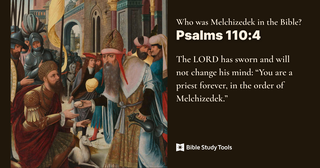
- Recent Translations
- All Translations
Psalm 110:4
Share
Settings
Images for Psalm 110:4

Psalm 110:4 in Other Translations
Psalm 110:4 Meaning and Commentary
The Lord hath sworn, and will not repent
What he swore about, and did not repent of, was the priesthood of Christ, as follows; and which shows the importance of it, since when Jehovah swears, as it is by himself, because he can swear by no greater; so it is about matters of great moment only that are sworn to by the Lord, as this of the priesthood of Christ was; which was concerned in things pertaining to God and his glory, as well as in making reconciliation for the sins of his people: and it shows the truth, and was for the confirmation of it; since doubts might arise whether the Aaronic priesthood was changed, seeing it was given to Phinehas for an everlasting priesthood; and since so great a person as the Son of God is said to be a priest; and since, in the human nature, he was of the tribe of Judah, of which tribe nothing was said concerning the priesthood: and this oath was not so much for Christ's sake, to establish the priesthood with him, and assure him of it, as for the sake of his people; who, by two immutable things, the word and oath of God, might have strong consolation from it; and it clearly shows the validity of his priesthood; that he was called of God to this office, and invested with it, and consecrated in it with an oath; and which is expressive of the singularity of it, and of the dignity and preference of the priesthood of Christ to that of Aaron's, ( Hebrews 7:20 Hebrews 7:21 Hebrews 7:28 ) . What follows was said, and this oath was made, in the council of peace, when Christ was called to this office, and he accepted of it, ( Psalms 40:6-8 ) , and of this the Lord never repented; as he never does of any of his acts of grace, ( Numbers 23:19 ) ( Romans 11:29 ) .
Thou art a priest for ever after the order of Melchizedek;
or, "according to the word of Melchizedek" F26; that is, according to what is said of him; there being an agreement between the things said of one and of the other; so the Syriac version, "according to the likeness of Melchizedek", see ( Hebrews 7:15 ) of him no mention is made elsewhere, but in ( Genesis 14:18 ) and in the epistle to the Hebrews. Various are the opinions of men concerning him: some think he was not a man, but an angel that appeared to Abraham: others, a divine power, superior to Christ, who were called "Melchizedecians": and others, that he was the Holy Ghost; and others, the Son of God himself, in an human form. On the other hand, some take him to be a mere man. The general notion of the Jews is, that he was Shem, the son of Noah; others, that he was a Canaanitish king, of the posterity of Ham: but others do not think it proper or lawful to inquire who he was, or from whom he descended; this being purposely hidden from men, that he might be more clearly a type of Christ. That there is a likeness between them is certain; the signification of his name, a title of office, King of righteousness, and King of peace, agrees with Christ the Lord, our righteousness and our peace: his being without father, mother, descent, beginning of days, and end of life, agree with the divinity, humanity, and eternity of Christ; and who is likewise King and Priest, as he was; and who blesses his people, as he did Abraham; and refreshes them with bread and wine, as he did Abraham's soldiers; (See Gill on Hebrews 7:2). (See Gill on Hebrews 7:3). Now Christ is a Priest like him; whose office is to offer sacrifice, which he has done, even himself, for the atonement of the sins of his people; to make intercession for them, which he ever lives to do; to introduce their persons to his Father, and present their petitions to him; and to call for every blessing for them, and answer all charges against them: in which office he continues for ever; there never will be any change in his priesthood, as there has been in Aaron's; nor will he ever have any successor: his priesthood is unchangeable, or does not pass from one to another, ( Hebrews 7:24 ) , the efficacy of his blood and sacrifice always continues, and intercession is ever made by him, and the glory of his mediation is ever given him. The apostle produces this passage in proof of the change of the Aaronic priesthood, and so of the law, ( Hebrews 7:11-19 ) and about the time Christ appeared as the high priest, the legal priesthood sensibly declined, and which the Jews themselves own; for they say,
``after the death of Ishmael Ben Phabi, the splendour of the priesthood ceased F1;''which man was made priest by Valerius Gratus, governor of Judea, under Tiberius Caesar F2,
F26 (ytrbd le) "super meum verbum", Montanus; "juxta verbum", Vatablus.
F1 Misn. Sotah, c. 9. s. 15.
F2 Joseph. Antiqu. l. 18. c. 2. s. 2. Vid. ib. l. 20. c. 7. s. 8.
